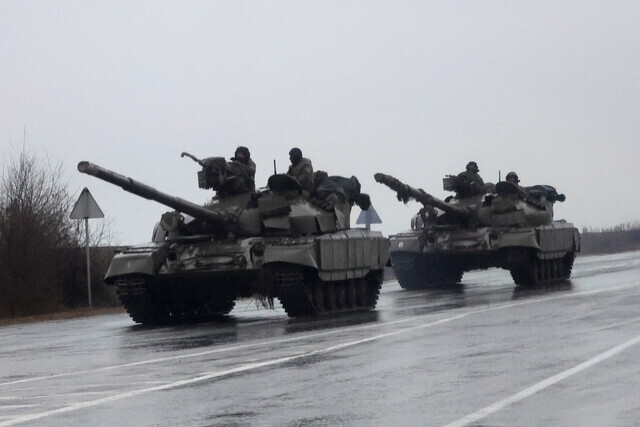hankyoreh
Links to other country sites 다른 나라 사이트 링크
As Russia moves into Ukraine, the world awaits China’s next move

As Russia’s invasion of Ukraine becomes a reality, attention is turning to the next moves from China, which has recently been showing off its close ties with Moscow.
Given Beijing’s history of adopting a principle of “geopolitical pragmatism” in its foreign affairs, most analysts predict it will continue observing the situation and stressing the importance of dialogue and negotiation for the time being, rather than taking anyone’s side.
While China does not want to see the chaos in Ukraine last into the long term, it also stands to benefit in some ways from the US being hampered by the situation there.
The positions shared by China since Russia first began intensifying its troop presence along the Ukrainian border late last year can be summed up in three points.
First, it has insisted on the need to respect Russia’s “rational security concerns.” This suggests that the current situation is the result of Russia’s security concerns, prompted by the ongoing expansion of NATO — which it describes as a “Cold War relic” — into Eastern Europe even after the end of the Cold War.
Chinese President Xi Jinping explicitly stated his opposition to NATO’s expansion in a joint statement issued after his summit with Russian President Vladimir Putin on Feb. 4.
Second, China has maintained that all countries’ sovereignty, independence, and territory should be preserved.
In a virtual speech at the Munich Security Conference on Saturday, Chinese Foreign Minister Wang Yi said, “The sovereignty, independence and territorial integrity of all countries should be respected and safeguarded. This is a basic norm of international relations that embodies the purposes of the UN Charter. It is also the consistent, principled position of China. And that applies equally to Ukraine.”
Third, it has claimed that responsibility for the situation deteriorating lies with the US for raising tensions around Ukraine, fomenting fear, and exaggerating the threat of war.
In a regular briefing Wednesday, Chinese Foreign Ministry spokesperson Hua Chunying said, “If someone keeps pouring oil on the flame while accusing others of not doing their best to put out the fire, such kind of behavior is clearly irresponsible and immoral.”
Beijing showed a similar attitude when Russia annexed the Crimean Peninsula in March 2014. Then-Chinese Foreign Ministry spokesperson Hong Lei said at the time, “China is consistent in its position of respecting all countries' independence, sovereignty and territorial integrity.”
“All parties should exercise restraint and avoid taking actions that may sharpen the dispute. The international community should make constructive efforts in defusing the tension,” he urged.
When the UN Security Council and General Assembly voted on resolutions condemning the annexation of Crimea, China opted to abstain rather than exercise its veto powers. It did not officially express its approval of Russia’s annexation of the peninsula either.
But it did offset the effects of economic sanctions on Russia by the US and EU when it signed a contract with it for US$400 billion worth of natural gas supplies in May of the same year.
By Jung In-hwan, Beijing correspondent
Please direct questions or comments to [english@hani.co.kr]

Editorial・opinion
![[Column] Season 2 of special prosecutor probe may be coming to Korea soon [Column] Season 2 of special prosecutor probe may be coming to Korea soon](https://flexible.img.hani.co.kr/flexible/normal/500/300/imgdb/original/2024/0426/3317141030699447.jpg) [Column] Season 2 of special prosecutor probe may be coming to Korea soon
[Column] Season 2 of special prosecutor probe may be coming to Korea soon![[Column] Park Geun-hye déjà vu in Yoon Suk-yeol [Column] Park Geun-hye déjà vu in Yoon Suk-yeol](https://flexible.img.hani.co.kr/flexible/normal/500/300/imgdb/original/2024/0424/651713945113788.jpg) [Column] Park Geun-hye déjà vu in Yoon Suk-yeol
[Column] Park Geun-hye déjà vu in Yoon Suk-yeol- [Editorial] New weight of N. Korea’s nuclear threats makes dialogue all the more urgent
- [Guest essay] The real reason Korea’s new right wants to dub Rhee a founding father
- [Column] ‘Choson’: Is it time we start referring to N. Korea in its own terms?
- [Editorial] Japan’s rewriting of history with Korea has gone too far
- [Column] The president’s questionable capacity for dialogue
- [Column] Are chaebol firms just pizza pies for families to divvy up as they please?
- [Column] Has Korea, too, crossed the Rubicon on China?
- [Correspondent’s column] In Japan’s alliance with US, echoes of its past alliances with UK
Most viewed articles
- 1‘We must say no’: Seoul defense chief on Korean, USFK involvement in hypothetical Taiwan crisis
- 2AI is catching up with humans at a ‘shocking’ rate
- 3S. Korea “monitoring developments” after report of secret Chinese police station in Seoul
- 4The dream K-drama boyfriend stealing hearts and screens in Japan
- 5[Column] Can we finally put to bed the theory that Sewol ferry crashed into a submarine?
- 6[Editorial] Yoon cries wolf of political attacks amid criticism over Tokyo summit
- 7Doubts remain over whether Yoon will get his money out of trip to Japan
- 8[Photo] “Comfort woman” survivor calls on president to fulfill promises
- 9[Editorial] Was justice served in acquittal of Samsung’s Lee Jae-yong?
- 10Is N. Korea threatening to test nukes in response to possible new US-led sanctions body?